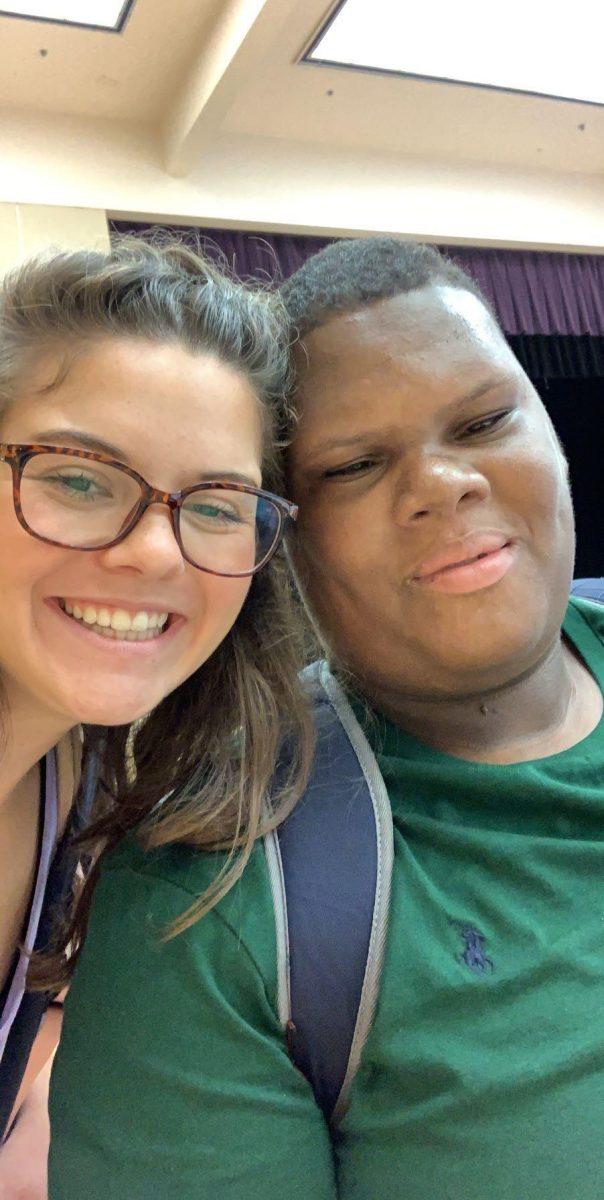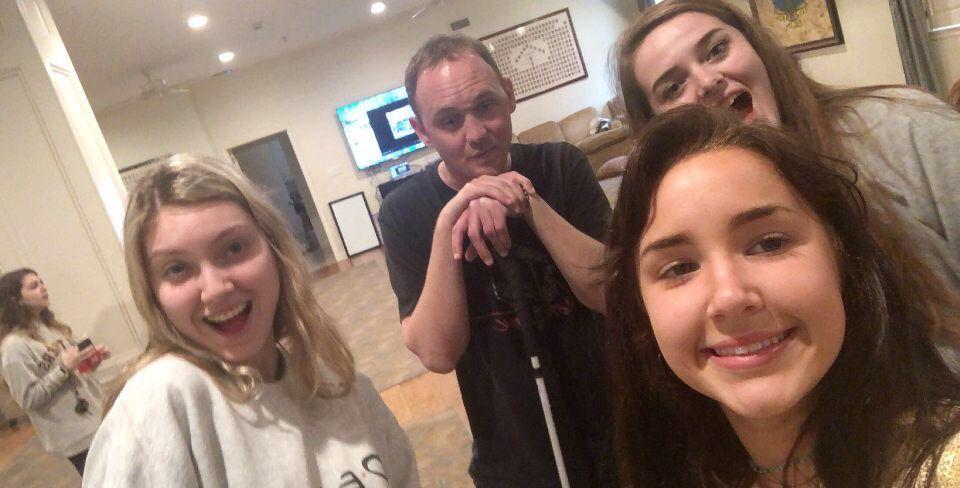Business administration freshman Ryan Barnes said when he applied to LSU, the University seemed invested in his success, but when he arrived on campus in the fall, he experienced a different reality.
Barnes is visually impaired and encounters faulty online textbooks, unreliable notetakers, poorly administered audio tests and improper Braille signage on a daily basis.
Director of Disability Services Benjamin Cromwell said in two separate conversations, one with Barnes and one with his mother, Felicia Jackson, that if Barnes couldn’t find his way around campus, he should go somewhere else for an education, according to Barnes and Jackson.
“(The Office of Disability Services) just (does) the bare minimum,” Barnes said.
Despite scheduling his classes in the middle of June, Barnes didn’t receive information on how to acquire his textbooks until several weeks into the school year. When he finally received access to his online materials, he discovered the text was incompatible with his voice reading software.
A lack of visibility strips on staircases and proper Braille signage labeling bathrooms and classrooms also poses difficulty for visually impaired students. Bathrooms in Prescott Hall are not labeled with any type of signage, Braille or otherwise, so Barnes has accidentally walked into the women’s restroom on two separate occasions.
Title II of the Americans with Disabilities Act requires state and local governments, including the University, to comply with federal regulations. While new University buildings are in compliance with ADA policy, some of the older buildings still are not. The University is legally mandated to formulate a plan to bring these buildings up to code.
Another obstacle Barnes faces is ODS rules stipulating no one who has previously taken a class, or majors in the class’ subject, can orally administer tests. The result of this rule is readers mispronouncing and stumbling over unfamiliar terminology.
“It gets to a point where I tell them, ‘Just put F, or C or B,” Barnes said.
The ODS policy is intended to prevent cheating, but Barnes said that’s not a good enough excuse.
“I don’t give a care if they’ve got a master’s degree in that subject, I need a person who can understand the words on the page to read me my test,” Barnes said.
Second-year law student Hayden Presley said his experience with ODS at LSU is starkly different from his undergraduate years at the University of Louisiana at Lafayette.
While LSU’s textbooks for visually impaired students are difficult to navigate and sometimes contain mistakes, UL Disability Services was diligent in making sure Presley had accessible course materials to complete his bachelor’s in computer science, Presley said.
“They were amazingly helpful at UL and incredibly devoted to making sure everything worked,” Presley said. “The woman who worked at the office (of disability services) literally spent days putting my study materials together for me.”
In contrast, a PDF of an LSU textbook once took Presley 20 minutes to open. Once he opened it, he didn’t have full access.
After struggles with the law school and ODS, the University provided Presley with textbook scans. While he no longer has to wait 20 minutes to do his assigned readings, Presley discovered the materials were riddled with erroneous wordage, making it difficult to understand Latin and French legal jargon.
Presley said UL students are provided with audio copies of textbooks directly from the publisher, which he said are both more accurate and accessible.
Additionally, the LSU Paul M. Hebert Law Center is divided into two sections— the east wing and the west wing. The newer east wing has Braille labels on every door, but the older west wing has no Braille signage. Presley said this initially presented difficulties, but he is now familiar with the building. Unlike Price and Barnes, Presley’s law student status means he doesn’t have to locate classes in multiple buildings.
Presley described LSU Disability Services as “not helpful” and “impersonal.” He said he often had to wait long periods of time to receive substandard answers.
“I understand LSU is a much larger campus than UL, but if you’re going to do this, you need to have the personnel to take care of it,” Hayden said.
UL may be smaller than LSU, but it holds the distinction of being the second-largest higher education institution in Louisiana, with over 19,000 students.
Psychology junior Josh Price said he has dropped numerous classes because of inaccessible course materials, and lack of staff and funds is no longer an acceptable excuse.
This semester, he was forced to withdraw from a course because of a textbook incompatible with his technology and a professor who offered little assistance.
“The school clearly has the money to help, it’s just not going to help us,” Price said.
Price lost his vision in a motorcycle accident three weeks after his 21st birthday. Now 34 years old, Price has spent many years adjusting to complete blindness and overcoming subsequent substance abuse issues. He went through rehabilitation and earned an associate’s degree at Daytona State College before fulfilling his lifelong dream of coming to LSU.
Price vividly remembers Cornwall saying Price “was not prepared” after hearing about Price’s difficulties finding his way around campus, even after earning an associate’s degree and completing 10 years of sobriety.
“The director of ODS said if you’re blind and you can’t get around, it’s because I came unprepared,” Price said. “What was I supposed to do, hook my brain up to wifi and download a map?”
Price said Cromwell compared his experience as a parapalegic to that of a visually disabled student. Price pointed out the two disabilities are not comparable, and Cromwell is fortunate to work in one of the few wheelchair accessible buildings on campus.
Price, a Tennessee native, had never been to Baton Rouge or stepped foot on the University’s campus before he transferred here.
“I went to another school for three and a half years and worked my butt off to get my GPA up,” Price said. “I suffered from depression and anxiety, so I went to psychological treatment to get straightened out before I got here. I did those things, and someone has the nerve to say I came unprepared? That’s at least four and a half years of getting ready to come here.”
Price, Presley and Barnes have coursework on top of their accommodation struggles. Price is looking into contesting the “W” he received after dropping a class this semester, but he will most likely not have time to pursue the issue any further.
Barnes said there have been many instances where he has asked his mother to speak to ODS on his behalf.
Presley was told the University was looking into acquiring publisher copies, but the idea never manifested into reality.
For now, Presley adjusted to using the scanned textbooks, Barnes continues to deal with poorly dictated tests and Price hopes the number of W’s on his record won’t push his graduation date back.
“It’s not a battle I can afford to fight right now,” Presley said. “I have to use what I have. You can’t get behind in law school.”
The Reveille reached out to Office of Disability Services Director Benjamin Cromwell, but he declined to comment.
LSU visually impaired students speak out about need for better textbooks, more Braille signage on campus
By Anna Jones
October 20, 2019
Ryan Barnes






